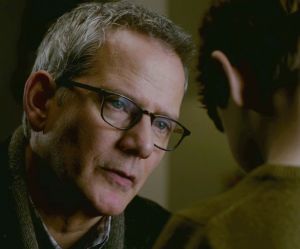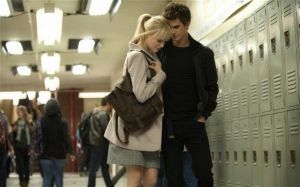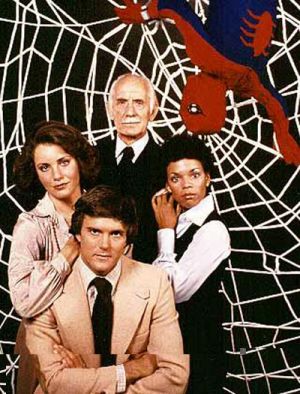The Tangled Web of Spider-Man on Film (Part 3)
By Troy-Jeffrey Allen
July 11, 2012 - 21:42
Studios: Marvel Studios
Starring: Andrew Garfield, Emma Stone, and Rhys Ifans
Directed by: Marc Webb
Produced by: Avi Arad, Laura Ziskin, Matt Tolmach
Running Time: 136 minutes
Release Date: July 3, 2012 (2012-07-03) (United States)
Rating: PG13 (Parents Strongly Cautioned)
Distributors: Columbia Pictures
"The best way for me to move forward on films is that I've got to be the singular voice that makes the creative choices on the film."
-Sam Raimi, director of the original Spider-Man trilogy (2009)
 |
| Box office receipts seem to suggest that the reboot was worth it. |
The Tangled Web of Spider-Man on Film (Part 3)
Click Here to Read Part 1
Click Here to Read Part 2
After Sam Raimi's last cinematic interpretation of Spider-Man, Columbia Pictures felt it was time for a new generation of potential viewers to re-discover the origin story of Marvel's wall crawler. Despite the grumblings of comic nerds and film purist everywhere, The Amazing Spider-Man reboot was quickly scheduled for a 2012 release date once plans for a Spider-Man 4 collapsed.
Conflicting press releases leading into ASM suggests that Columbia Pictures and the producers wanted two different films. Certain parties wanted a moodier origin story in the vein of 2005's Batman Begins with a hint of Twilight (Robert Pattinson was even rumored to be in negotiations). Other parties wanted it to be based on the Ultimate Spider-Man comic book series, a modern take on the hero that is tonally different to the recent Dark Knight films.
 |
| The filmmakers promise that Peter's parents will play a bigger role in future films, but do they need to? |
The grounded approach exposes Amazing Spider-Man's biggest flaw: That it still feels repetitive. It doesn't add anything darker or interesting to the origin, and it doesn’t improve on the previous trilogy's mistakes. Particularly, ASM shares the same problems as its 2002 predecessor: Once it gives the audience the "how" it doesn't know where to go from there.
The film's second act walks with uncertainty toward its conclusion, turning Rhys Ifan's one-armed scientist into an evil Lizard character with minimal flare or build up. It's here that Raimi's contribution to the franchise is most obvious. While Webb tries to give the pseudo-science a Nolan-esque approach, Raimi reveled in the mad scientist subplots of the originals. It allowed him to push the limits of the PG-13 rating by embracing his roots in frenzied horror. Put simply, Raimi's take on the villains worked because it was over-the-top, Webb's take is too sober for the unavoidable comic book elements.
 |
| Garfield and Stone add tons of personality to their characters. Unfortunately, the script gives them little to say. |
Webb doesn't have to take all of the blame though, some of that may have to do with the fact that Freaks and Geeks’ Paul Feig was brought on during production to tweak a script already worked on by James Vanderbilt (The Rundown), Steve Kloves (The Harry Potter films), and Alvin Sargent (Ordinary People). Specifically, Feig was asked to punch up some of the teenage dialogue. This is a bit confusing too, since most of Garfield and Stone's scenes involve mostly awkward pauses that feel more ad-libbed than scripted.
Once again, the lack of a singular vision conflicts yet another Spider-Man film and the proof is on screen. But why does it keep happening? The answer may have a lot to do with Spider-Man's often celebrated status as a super-powered everyman.
 |
| Garfield's take on Peter Parker may not be for everyone, but it is refreshing. |
Ever since the character hit the newsstands in 1962's Amazing Fantasy #15, he has often been referred to as a hero that could easily be any one of us. Peter Parker may have fought crime in a red and blue unitard but he also got the flu, couldn't pay his rent, hated his boss, and couldn't ask out girls. His relevance to the Average Joe is what made him unique. It's also what has caused the 50 year old comic book series to undergo so many awkward editorial turns. When everybody can see themselves in one character, after awhile that character becomes more autobiographical than everyman. It's a problem that has plagued the Spider-Man books for decades (he's too young, he's too old, he's married, he's divorced, etc.), only to effect the films as well (Maguire is too nerdy, Garfield is too emo, etc.). This always results in storylines that alienate the most vocal parts of the fanbase. Unlike the usual adaptation woes of most comic book movies, Spider-Man's biggest problem just might be that we all want to relate to him.
Maybe. Or perhaps I’m wrong and the Hollywood greed machine is just as fickle as it has always been.
 |
| Just in case you thought I forgot. |
Rating: 6/10
Related Articles:
Review: Amazing Spider-Man #4
The Amazing Spider-man #1.2
The Amazing Spider-man 2
The Amazing Spider-Man #1 (2014) Review
David Morrell and Klaus Janson's The Amazing Spider-Man #700.1 and 700.2 Review
The Amazing Spider-Man 2 Trailer
The Amazing Spider-Man #700 Review
Amazing Spider-Man #699 Review
The Binquirer, Pre-Con Edition: New 52 changes, Marvel NOW!, San Diego Comic Con, Amazing Spider-Man, and much more!
The Amazing Spider-man – Great but Humourless
